Men's language discovers what country they are of, likewise what manner of spirit they are of The heart is the fountain, words are the streams A troubled fountain, and a corrupt spring, must send forth muddy and unpleasant streamsThe ESV says, "every careless word" The Greek phrase is rema argos, meaning "careless or inactive or unprofitable words" In context, Jesus is contrasting the "good"THE GOSPEL OF MATTHEW" Every Idle Word () INTRODUCTION 1 The standards of God are much different than those of the world cf Isa 558,9 2 A striking example of this difference pertains to one's speech
Matthew 12 35
Matthew 12 36 37 meaning
Matthew 12 36 37 meaning-How could evil men like you speak what is good and right?Matthew 12 1 At about that time Jesus was walking through some grainfields on the Sabbath His disciples were hungry, so they began breaking off some heads of grain and eating them 2 But some Pharisees saw them do it and protested, "Look, your disciples are breaking the law by harvesting grain on the Sabbath"




Ig Yolys Crochet Matthew 12 36 37 Bible Truth Words Quotes
Matthew are a set of verses in the twelfth chapter of the Gospel of Matthew in the New Testament Content In the original Greek according to WestcottHort for this verse is 36Λέγω δὲ ὑμῖν ὅτι πᾶν ῥῆμα ἀργόν, ὃ ἐὰν λαλήσωσιν οἱ ἄνθρωποι, ἀποδώσουσι περὶMatthew We can determine which side somebody is on by the fruits of his life If a person is on Christ's side, then he will produce Christlike fruit But if he is on Satan's side, he will produce Satan's fruit It is fairly easy to tell The Pharisees hear all this—and they ask for a sign What does Jesus mean in Matthew where he's talking about oaths?
* 1236–37 If on the day of judgment people will be held accountable for even their careless words, the vicious accusations of the Pharisees will surely lead to their condemnation * 1238–42 This section is mainly from Q (see Lk 1129–32) Mk 811–12, which Matthew has followed in Mt 161–4, has a similar demand for a sign TheFor out of the abundance of the heart the mouth speaksNor is any such Scripture to be found They are rather proverbial expressions, in common use among the Jews;
Matthew 1233–37 3 Then let us arise and go up to Bethel, so that I may make there an altar to the God gwho answers me in the day of my distress and hhas been with me wherever I have gone"Inspired by the Holy Spirit of truth, David addressed the Lord Jesus as, " my Lord" Jesus was both son of David by birth and David's Lord, by virtue of His deity Christ was so much more than the son of David, for this great king of Israel had identified Jesus Christ as Lord The Pharisees and leaders of Israel recognised the staggering reality Mat 2234 But when the Pharisees heard that He had silenced the Sadducees with His reply, they met together to question Him again Mat 2235 One of them, an expert in religious law, tried to trap Him with this question Mat 2236 "Teacher, which is the most important commandment in the law of Moses?" Mat 2237 Jesus replied, "'You must love the LORD your




What Does Matthew 12 Mean




Ig Yolys Crochet Matthew 12 36 37 Bible Truth Words Quotes
Matthew 1236 1237 Now viewing scripture range from the book of Matthew chapter 1236 through chapter 1237 Matthew Chapter 12 36 But I say unto you, That every idle word that men shall speak, they shall give account thereof in the day of judgment 37 For by thy words thou shalt be justified, and by thy words thou shalt be condemnedMatthew 1236 in the Thematic Bible;How do you suppose what you say is worth anything when you are so foulminded?



Matthew 12 35



Matthew 12 34
⇑ See verse text ⇑ This is yet another reference to the day of judgment This will happen at Christ's triumphant return to earth, also called the second coming or the day of the Lord When Jesus returns, He will hold allWhat does Matthew 1237 mean?Let your yes be yes and your no be no Answer by J I Packer Page 1 of 1 Jesus is referring to the ceremonious way in




You Will Give An Account For Every Word That You Speak Matthew 12 36 37 Youtube




Prayer Pointers Matthew 12 36 37 My Words Will Not Condemn Me
Matthew 1236 Context 33 Either make the tree good, and his fruit good;'Good Fruit' — Matthew Jesus continued his reply to the Pharisees "A tree is identified by its fruit If a tree is good, its fruit will be good If a tree is bad, its fruit will be bad You brood of snakes!36 So I tell you this, that for every unfounded word people utter they will answer on Judgement Day, 37 since it is by your words you will be justified, and by your words condemned' 38 Then some of the scribes and Pharisees spoke up 'Master,' they said, 'we should like to see a




Matthew 12 36 Will We Really Be Judged For Every Careless Word We Utter Matthew Leonard Youtube




The Gospel
Matthew Commentary Matthew 536 "Nor shall you make an oath by your head, for you cannot * make one hair white or black ( NASB Lockman) Greek mete en te kephale sou omoses, ( 2 SAAS) oti ou dunasai ( 2 SPMI) mian tricha leuken poiesai ( A AN) e melainan Amplified And do not swear by your head, for you are not able to make a singleMatthew 1237 For by your words you will be acquitted, and by your words you will be condemned" Romans 1412 So then, each of us will give an account of himself to God James 36 The tongue also is a fire, a world of wickedness among the parts of the body Jesus said, "I tell you that everyone will have to give account on the day of judgment for every empty word they have spoken" (Matthew 1236) The KJV translates "every empty word" as "every idle word";




Mt 12 36 37 But I Say Unto You That Every Idle Word That Men Shall Speak They Shall Give Account Thereof In The Day Of Judgment For By Thy Words Thou Ppt Download




Matthew 12 37 Words Bible Inspiration Christian Friends
(37) "For by your words you will be justified, and by your words you will be condemned" He is not necessarily saying that you earn eternal life by saying so He is indicating is that the words are an accurate measure of the heart,Matthew American Standard Version (ASV) And I say unto you, that every idle word that men shall speak, they shall give account thereof in the day of judgment For by thy words thou shalt be justified, and by thy words thou shalt be condemnedChrist speaks here concerning idle words, and shows what evil there is in them (Matthew 1236;




Pdf This Generation In Matthew 24 34 As A Timeless Spiritual Generation Akin To Genesis 3 15




Words Grandma S Ramblings
For a tree is known by its fruit Brood of vipers! Then I would read Psalm 23, 37, 91, and 119 everyday, sometimes twice a day, morning and night as well as Matthew 57 to keep my mind full because of what Matthew says Reply J saysFancying no great crime is committed, when only words are spoken, and no facts done;



What Did Christ Mean By Careless Words Fountain Of Life



Matthew 12 36 37 People Who Call Themselves
Matthew "But I tell you that every careless word that people speak, they shall give an accounting for it in the day of judgment For by your words you will be justified, and by your words you will be condemned" (Matthew ) Well, that's not good How many careless words have I spoken in my lifetime Dozens?Matthew 1236,37 Jesus believed that speech is important I wouldn't think anybody would dispute that We use our tongues on a daily basis, and when we hear of someone who is mute or impaired in their speech through some physical, medical or emotional condition, we are sorry and perhaps entertain the fear of suffering such a loss Jesus said we are accountable for every "idle word" we speak According to Matthew (NLT) Jesus said this to the Pharisees "you must give an account on judgment day for every idle word you speak The words you say will either acquit you or condemn you" The Greek word argos – here translated as




Matthew 12 36 37 Mission Venture Ministries




Matthew 12 36 Bible Verse Kjv Dailyverses Net
How can you, being evil, speak good things?& Judgment for Idle Words (Matt) Question Hi Bob I have two somewhat related questions In Jeremiah, the Lord tells the people not to say "the burden of the Lord" Could you please explain that, and also please explain Matthew where we are told that we will "give an account" for the careless words we speak ResponseMuch more is there in such wicked words as the Pharisees spoke It concerns us to think much of the day of judgment, that that may be a




Matthew 12 36 But I Tell You That Every Careless Word That People Speak They Shall Give An Accounting For It In The Day Of Judgment




Matthew 12 33 37 The King S Judgment Of The Human Heart Youtube
That every idle word that a man shall speak, they shall give accountMatthew 2436 This states that no Christian can know the day or hour of Christ's coming, that is, no one can know the exact time of Christ's return Jesus Christ has given us these verses in Matthew so we can know the general time of His coming and the rapture5 (Mat ) The words of the religious leaders betray the depravity of their hearts "Either make the tree good and its fruit good, or else make the tree bad and its fruit bad;
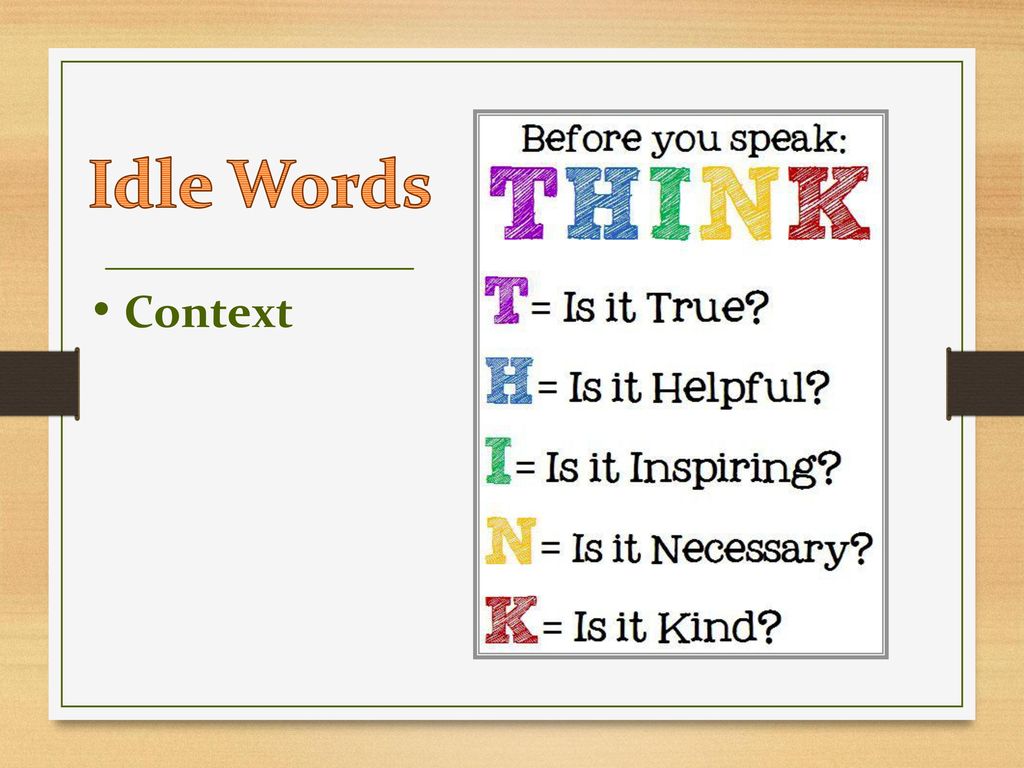



Idle Words Matthew 12 36 Idle Words Matthew 12 Ppt Download
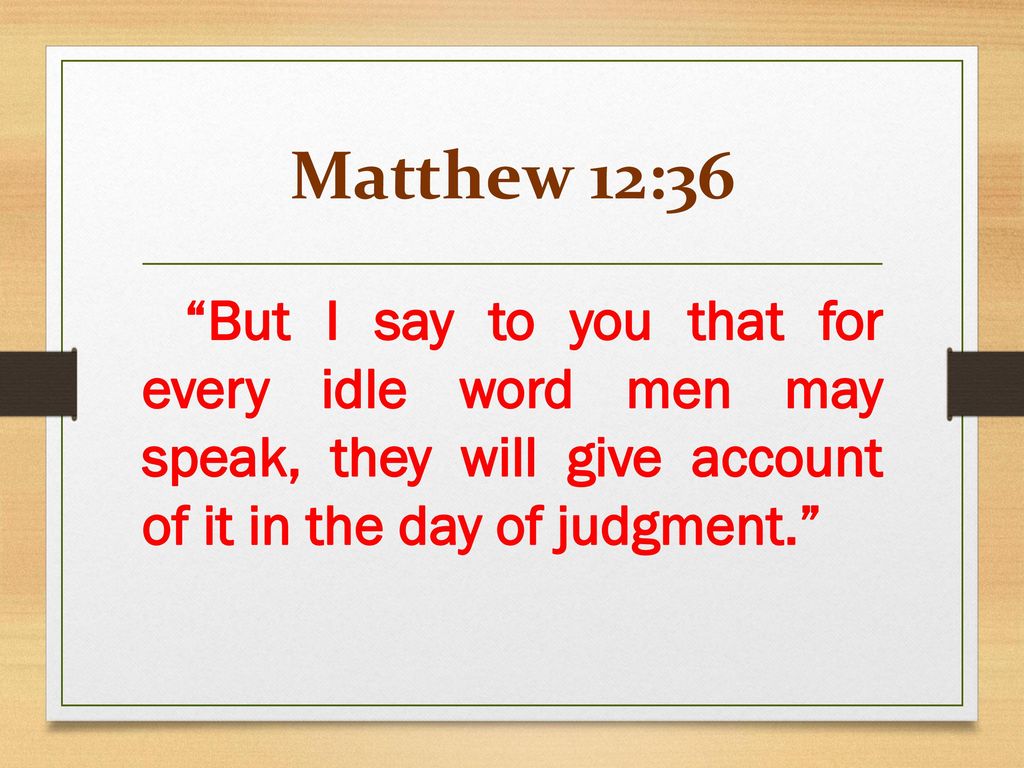



Idle Words Matthew 12 36 Idle Words Matthew 12 Ppt Download
Matthew "But I say unto you, That every idle word that men shall speak, they shall give account thereof in the day of judgment For by thy words thou shalt be justified, and by thy words thou shalt be condemned" In short we need to be careful what we say because God will judge us by the things we sayMatthew We can determine which side somebody is on by the fruits of his life If a person is on Christ's side, then he will produce Christlike fruit But if he is on Satan's side, he will produce Satan's fruit It is fairly easy to tell The Pharisees hear all this—and they ask for a signIt's your heart, not the dictionary, that gives meaning to your words A good person produces good deeds and words season after season An evil person is a blight on the orchard
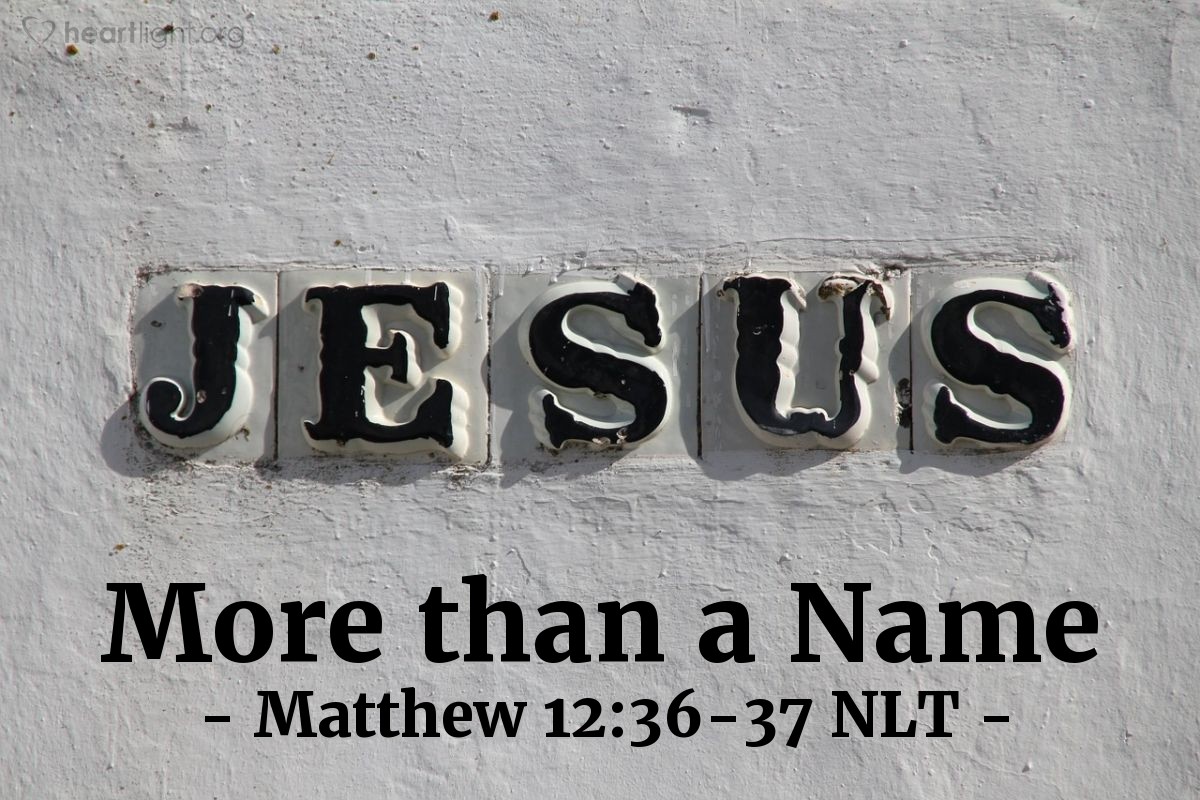



More Than A Name Matthew 12 36 37 What Jesus Did




What Are Idle Words Matthew 12 36 Gotquestions Org
MATTHEW 1236 KING JAMES VERSION (KJV) TRANSLATION, MEANING, CONTEXT WORDS OF JESUS IN RED To get what Matthew 1236 means based on its source text, scroll down or follow these links for the original scriptural meaning , biblical context and relative popularity " But I say unto you, That every idle word that men shall speak, they shall giveMatthew 1236 Cross References;Matthew Open menuThe MessageOpen menu 3437 "You have minds like a snake pit!




Matthew 12 36 But I Say To You That Every Idle Word That Men Shall Speak They Shall Give Account Thereof In The Day Of Judgment




Matthew 12 25 Esv
Matthew (and the parallel passage in Luke ) is a key passage for understanding the symbolic use of fruit in Scripture The context makes it explicitly clear that the fruit which comes from a person is not the works their life produces, butMatthew 12 smoldering wick A common household lamp was a small earthenware vessel filled with olive oil A flax wick drew the oil up to feed the flame The Greek expression rendered "smoldering wick" may refer to a wick that gives off smoke because an ember is still present but the flame is fading or is extinguishedMatthew 1236 Treasury of Scripture Knowing;
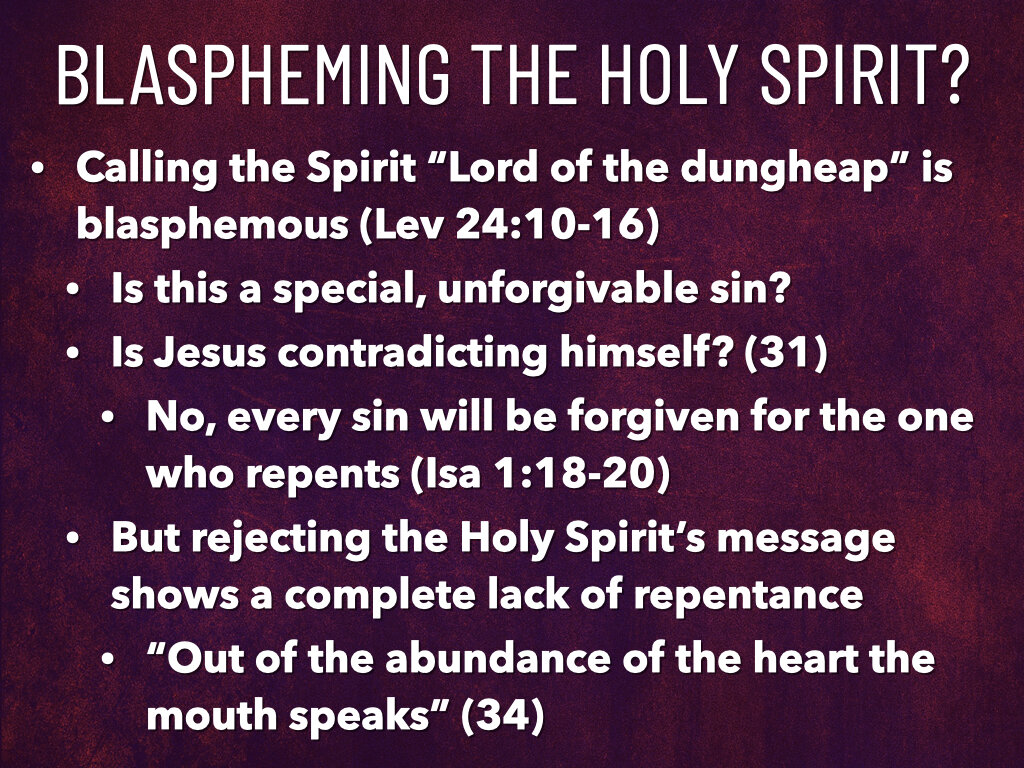



Rejecting What Is Good Matthew 12 22 37 Saraland Christians




Matthew 12 36 37 Kjv But I Say Unto You That Every Idle Word That Men Shall Speak They Shall Give Account Thereof Motivational Quotes For Love Thy Word Words
For whatever is in your heart determines what you sayCommentary on Matthew (Read Matthew ) Men's language discovers what country they are of, likewise what manner of spirit they are of The heart is the fountain, words are the streams A troubled fountain, and a corrupt spring, must send forth muddy andOr else make the tree corrupt, and his fruit corrupt for the tree is known by his fruit 34 O generation of vipers, how can ye, being evil, speak good things?




The Words Of My Mouth Matthew 12 34 37 Psalm 19 14 Ppt Download




Matthew 12 36 Words Perspective Youtube
Matthew 1236 Further Study Matthew 1236 in the Parallel Bible;⇑ See verse text ⇑ Jesus has mentioned the day of judgment, referring to His second coming during the end times At that time, all people will stand before Him Unbelievers, those who have rejected faith in Christ, will be forced to stand on their own merits (Revelation 11–15)Matthew 1237 Matthew 1236 But I say unto you This form of speaking is used, the more strongly to asseverate the truth of what is after said;




400 God Lifes Truths Ideas In 21 Inspirational Quotes Words Words Of Wisdom
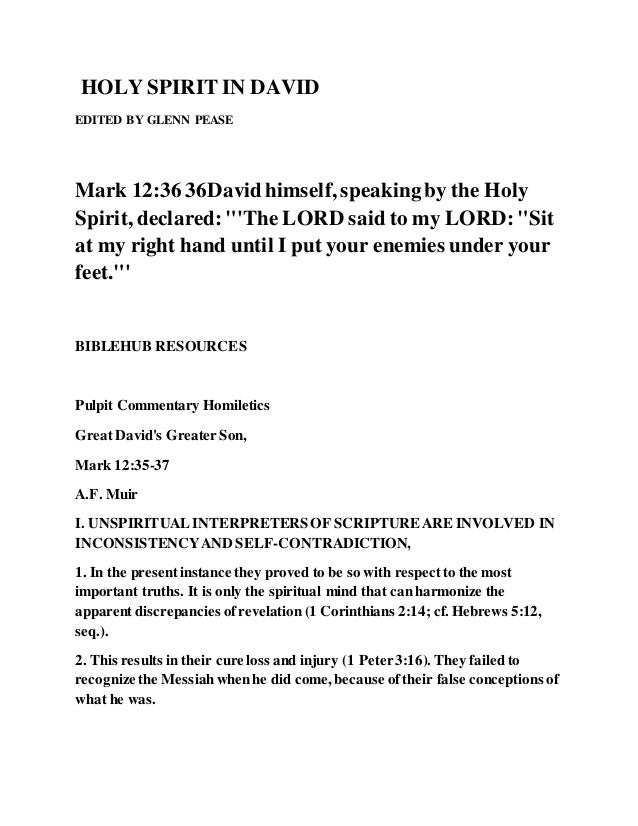



Holy Spirit In David
Jesus gave both the Pharisees and all men a warning in the principle He sets out in Matthew 1236 and 37 Careless Words & Judgement "And I say to you, that every careless word that men shall speak, they shall render account for it in the day of judgmentAnd (Revised Version) The adversative particle hints at the contrast of ver 35 to their ordinary ideas about the importance of words I say unto you, That every idle (ἀργόν);What does Matthew 1236 mean?




Idle Words Are Dangerous Will Be Judged Servus Christi




Matthew 12 28 Esv
Matthew 1236–37 — American Standard Version (ASV 1901) 36 And I say unto you , that every idle word that men shall speak , they shall give account thereof in the day of judgment 37 For by thy words thou shalt be justified , and by thy words thou shalt be condemnedIe effecting nothing, morally useless;Matthew 1237 For by thy words thou shalt be justified Theophylact seems to take these words to be a passage of Scripture cited by Christ, in proof of what he had said, but does not point to any;




Matthew 12 36 37 People Who Call Themselves




Matthew 12 36 37 I Live For Jesus
36 But I tell you that everyone will have to give account on the day of judgment for every empty word they have spoken 37 For by your words you will be acquitted, and by your words you will be condemned" ( A)And the rather, because men are apt to indulge a liberty with their tongues; Matthew 1236 The key words in this passage are "idle" and "account" The first word "idle" comes from the root Greek word ARGOS It means "not busy, idle, inactive, doing nothing, and sterile" When we apply it as Jesus did here in Matthew 1236, it has the idea of careless or casual words Our second word "account" comes from the Greek word APODIOMI




What Is The Unpardonable Sin Matthew 12 31 32 Mission Venture Ministries




Commentary In Isaiah
For out of the abundance of the heart the mouth speaketh 35 A good man out of the good treasure of the heart bringeth forth good things and an evil man out ofVerses 36, 37 Matthew only Verse 36 But (δέ);Or refer to the usual methods of




Matthew 12 15 37 Lesson 23 The Free Bible Lessons Center




Unforgiveness Overcoming The Struggle Against Desire For Revenge Inspirit Encourage




What Does Matthew 12 40 Mean



Matthew 12 36 37 Kjv




What Does Matthew 12 36 Mean




Finest Of The Wheat Logos Rhema By Percy Gutteridge




Matthew 12 36 37 Berea Project




Bible Verses About Idle Words




Commentary On Luke 9 28 36 37 43 Working Preacher From Luther Seminary
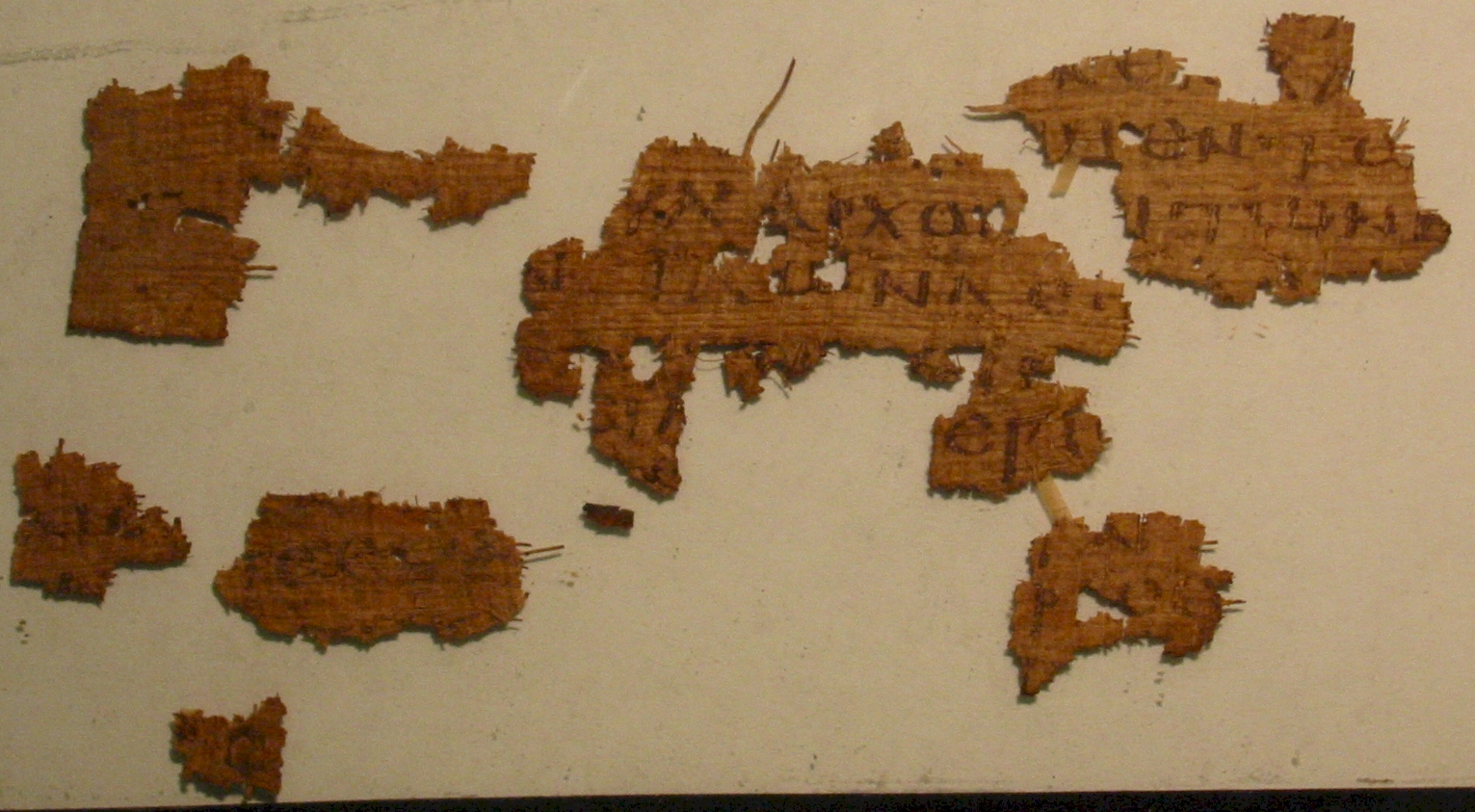



Matthew 12 Wikipedia




What Does Matthew 12 36 Mean




What Comes Out Of Your Mouth




Matthew 12 36 Kjv But I Say Unto You That Every Idle Word That Men Shall Speak They Shall Give Account Thereo Last Day Quotes Bible Knowledge God Loves Me




Matthew 12 36 37 36 But I Say
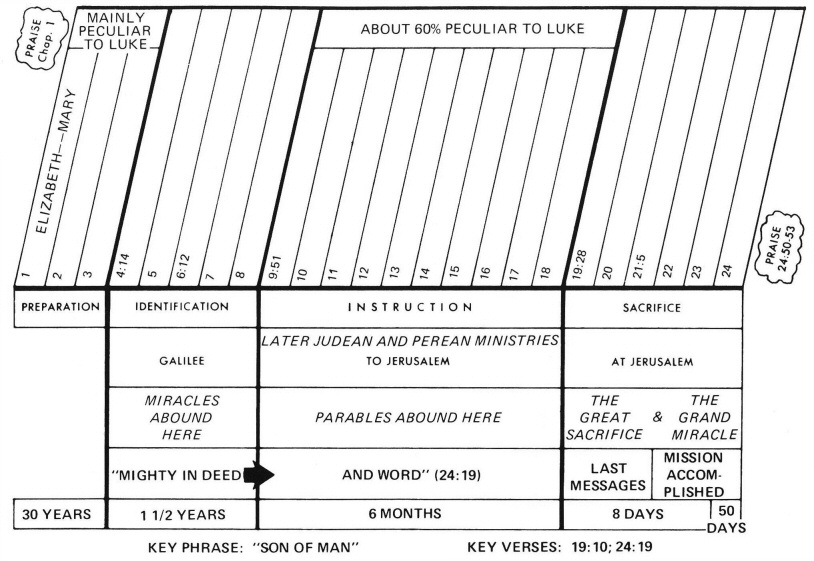



Luke 12 Commentary Precept Austin




Matthew 12 30 32 A Reason For Hope With Don Patterson
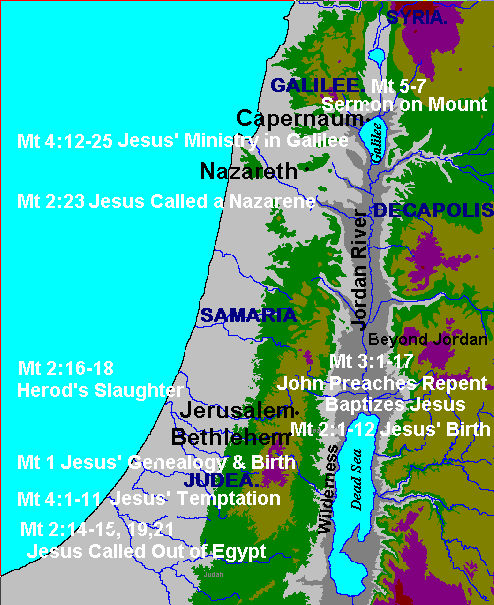



Matthew 5 36 37 Commentary Precept Austin




Discover And Read The Best Of Twitter Threads About Meditate




மத த ய 12 Matthew 12 Holy Bible Tamil Tamil Biblewordings Com




Matthew 12 36 37 36 But I Say



Matthew 12 50




John 10 36 37 Esv




Think Before You Speak Agents Of Light




Faith And Religion




Innocent Byabagamba Matthew 12 36 37 Kjv 36 But I Say Unto You That Every Idle Word That Men Shall Speak They Shall Give Account Thereof In The Day Of Judgment 37




Reaching The Lost For Jesus Matthew 9 37 38 Mission Venture Ministries




Speaking Deliberately Every Word Spoken Counts Wellspring Of Life
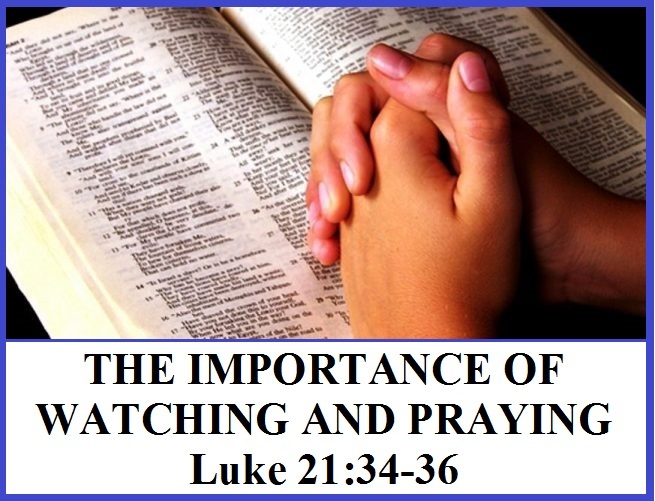



The Importance Of Watching And Praying Luke 21 34 36 Mission Venture Ministries
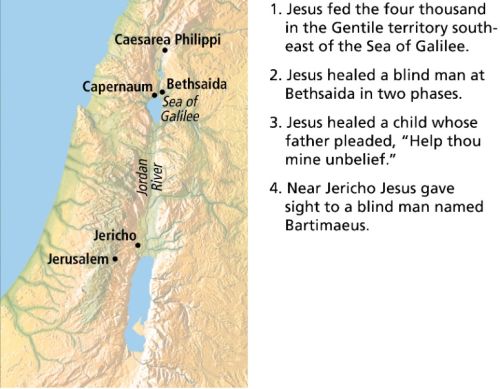



Chapter 13 Mark 8 10




Matthew 12 43 45 Mission Venture Ministries




Matthew 5 37 Wikipedia




Matthew Commentaries Sermons Precept Austin




Matthew 12 36 Bible Verse Kjv Dailyverses Net
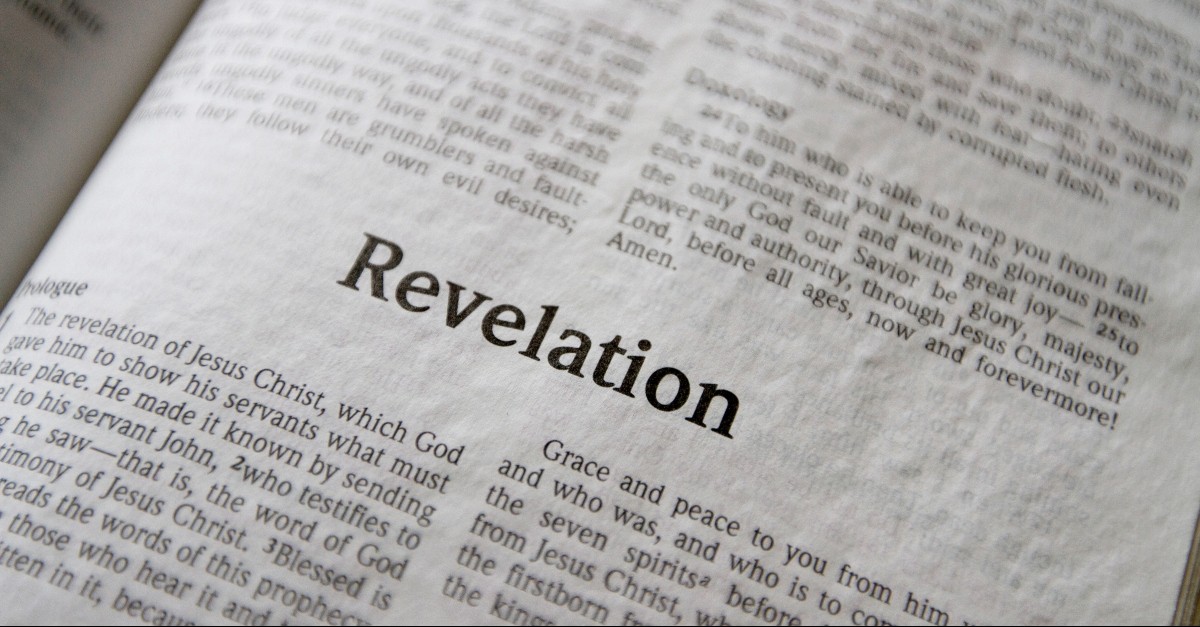



Purgatory In The Bible Scripture Verses And Meaning
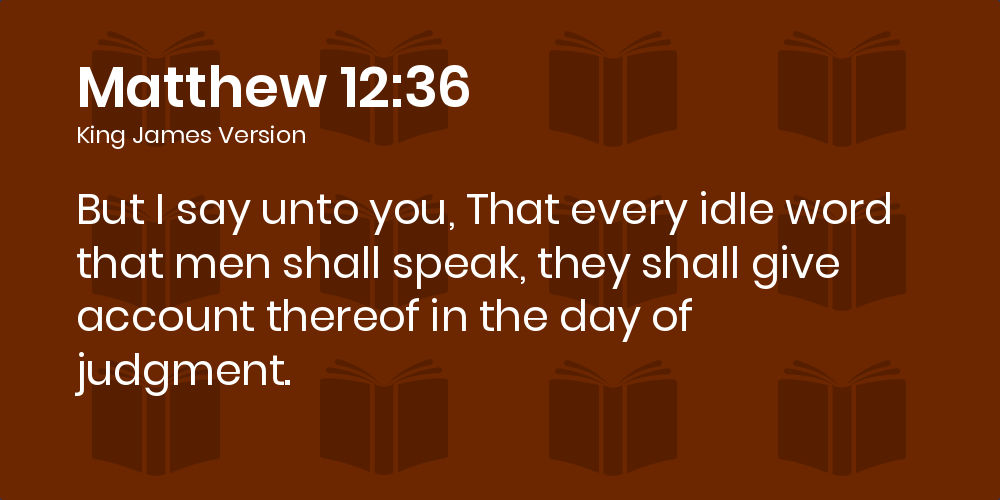



Matthew 12 36 Kjv But I Say Unto You That Every Idle Word That Men Shall Speak They Shall Give Account Thereof In The Day Of Judgment




What Does Mark 12 36 Mean
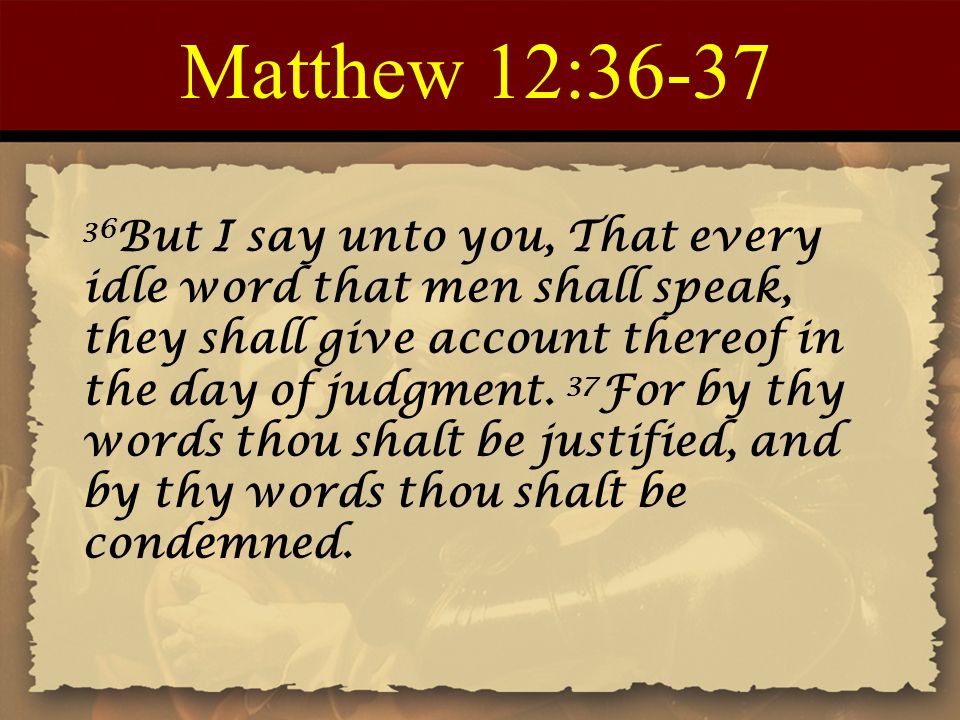



Matthew Chapter 12 Now There Breaks Out Into The Open A Conflict Between The Lord Jesus And The Religious Rulers Of That Day The Pharisees In Particular Ppt Download




What Are The Idle Words Referred To In Matthew 12 36 George S Journal




Matthew 12 36 37 But I Tell You That Everyone Will Have To Give Account On The Day Of Judgment For Every Empty Word They Have Spoken For By Your Words Ppt Download




Thought Of The Day T4christ




What Does Matthew 12 48 Mean
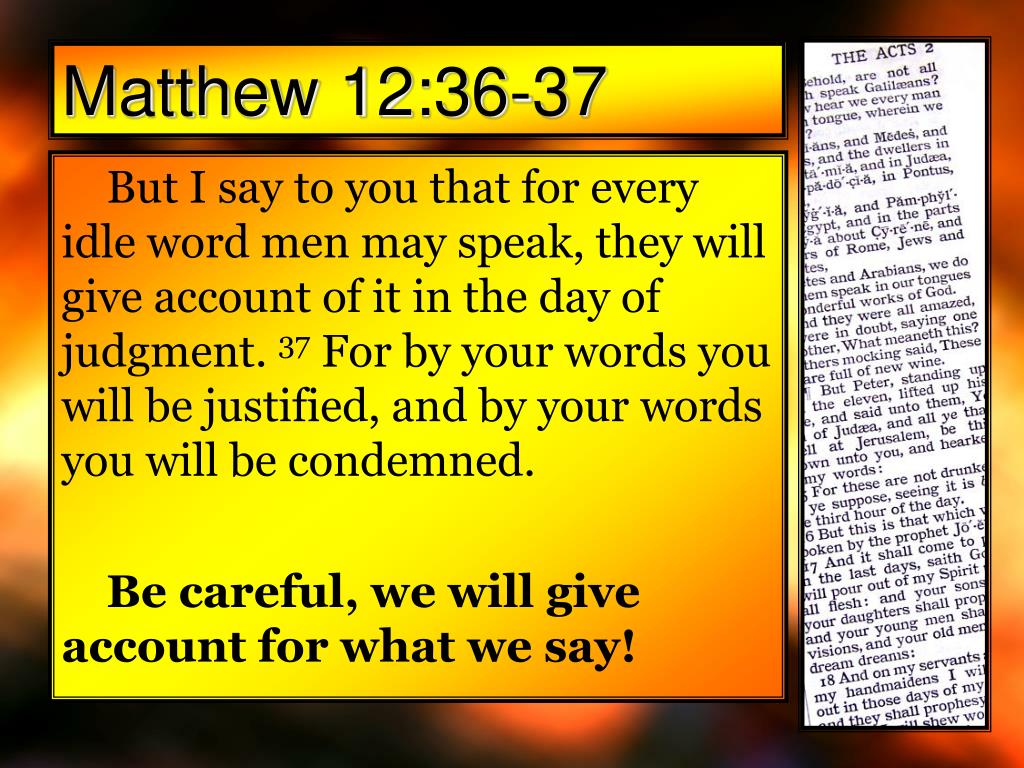



Ppt F O O L S Powerpoint Presentation Free Download Id




What Does Matthew 12 36 Mean




Luke 24 36 49 God Is Big Enough To Remove My Doubts Safe Haven Community Church




Matthew Commentaries Sermons Precept Austin
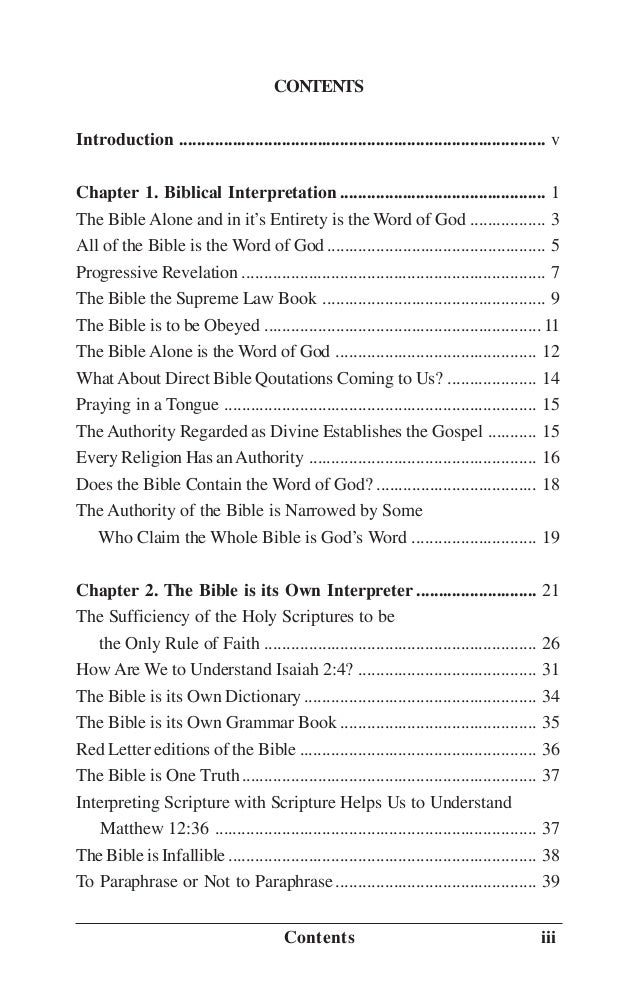



First Principles Of Bible Study




Devotional Words Matter D1w3 Week 3 Say What Monday Unfiltered Words When To Hold Your Tongue Read Proverbs 17 27 Ecclesiastes 5 2 Matthew 12 36 37 James 3 4 12 Soap Matthew 12 36 37 Matthew 12 36 37 I Tell You On The Day Of




Praying And Seeking Wisdom Matthew 12 36 37 Scares Me Does It You




Matthew 12 36 37 Inspirational Words Power Of The Tongue Words




Use Your Words For Good The Consecrated Woman



Matthew 12 36 37 36 But I Say




Matthew 16 Commentary Precept Austin




The Living Matthew 12 36 Ncv And I Tell You That On The




The Day Of The Lord




What Does Matthew 12 36 Mean




The Voices In The Dark




Matthew 12 36 37 Bible Study Youtube
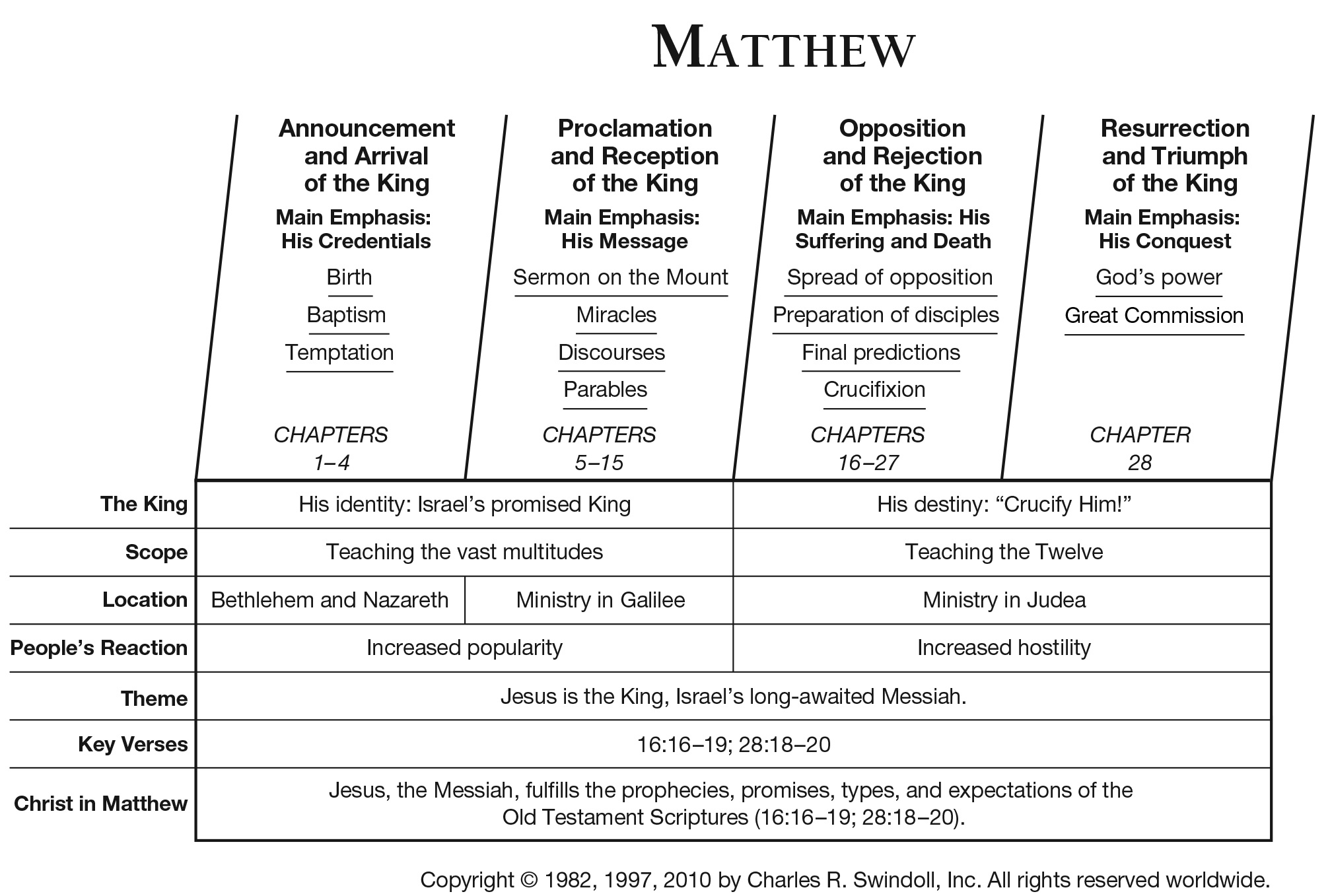



Matthew 7 22 23 Commentary Precept Austin




Bible Verses About Swear Words




Matthew 12 36 37 Mimi Emmanuel




What Does The Bible Say About The Power Of Words Gotquestions Org




More Than A Name Matthew 12 36 37 What Jesus Did




Who S Your Family Matthew 12 46 50




What Does Matthew 22 37 Mean




Mean Scores Sd Of The Primary And Secondary Outcome Measures At Each Download Table



Matthew 12 36 But I Say To You That Every Idle Word That Men Shall Speak They Shall Give Account Thereof In The Day Of Judgment




Do Your Words Wound Or Heal Part 1



Handbook For Life Org Uk



0 件のコメント:
コメントを投稿